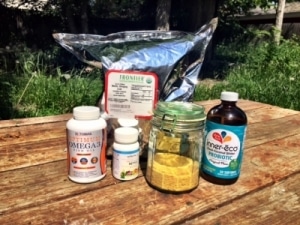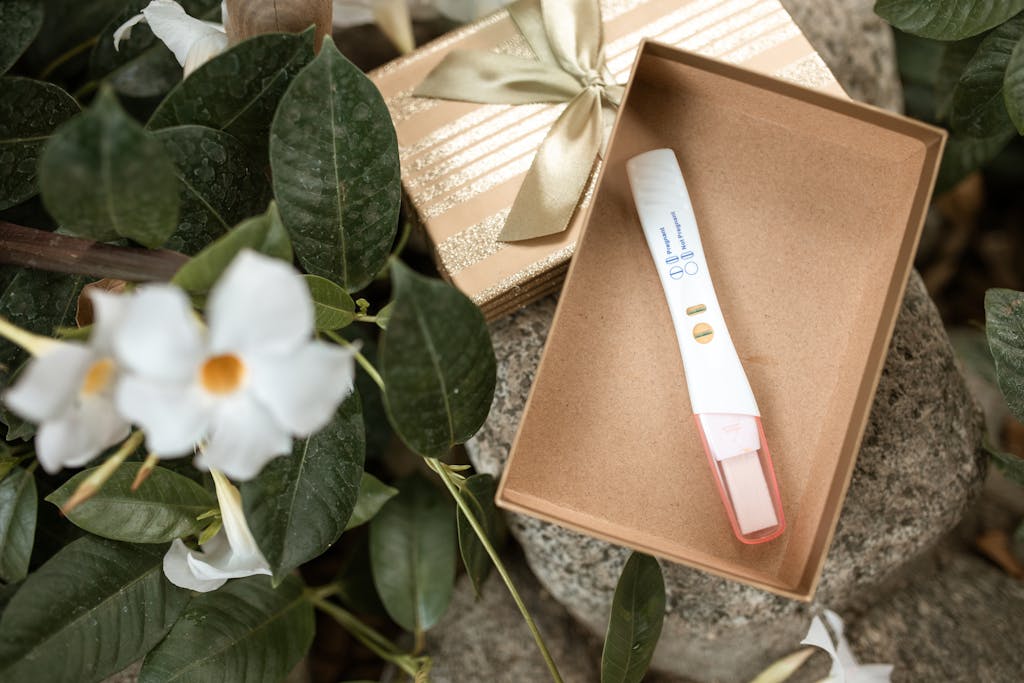Natural Allergy Relief for Dogs
Published on June 5, 2015 by Dr. Caitlin Gordon
Finding natural allergy relief for dogs become my top priority once Koa’s sneezing and coughing kept me from getting a decent night’s sleep. Let me start by saying I am not a vet, and this is not intended to be medical advice. This is a collection of tips I have used with my own dogs with great success, based on good evidence and vet advice. Amounts given are based on my dog Koa who weighs 45 lbs.
 Common Signs your dog is suffering from allergies:
Common Signs your dog is suffering from allergies:
- Sneezing
- Rubbing face/pawing at face
- Goopy Eyes or Red eyes
- Lots of scratching, biting or licking their fur
- Coughing
- Lethargy
- Drippy nose
These signs can be indicative of other more serious problems, so please always seek out advice from your vet if you are unsure about your dog’s symptoms. If your dog is eating, pooping, peeing, and playing normally, these symptoms are likely due to allergies.
Koa, my dog, is prone to allergies both in spring and late summer. Starting in early April I put him on this regimen and have seen significant improvement. I want to share my natural allergy relief for dogs tips:
1. Grain-free dog food
He’s on this year-round, but it’s worth pointing out that just like humans, if not more so, grains are inflammatory for dogs. Grains are not naturally part of their diet and do not add necessary nutrition but instead are used as cheap filler. Dogs are carnivores; their diet should be primarily protein. Raw food diets are ideal but very pricey and/or time-consuming. Grain-free kibble is a good alternative.
As an addition, I give Koa frozen raw beef bones. These work wonders for keeping their teeth clean (seriously, it’s amazing) and provide important nutrients. Plus, your dog will love you. Serving them after a meal helps keep your dog from eating them too quickly. Serving them frozen cuts down on small pieces that might break off and pose a choking hazard. It’s always best to supervise your dog with frozen raw bones, but they are much safer than rawhide (spent 600$ on vet bills after my dog swallowed too many pieces of rawhide, never again!).
2. Fish oil
 Fish oil, just like for humans, is a powerful anti-inflammatory due to the omega-3s. It helps lubricate skin, fur, and joints. It also strengthens your dog’s immune system and soothes skin and mucous membranes, so it can help with allergy relief for dogs. Use caution in dogs that may have trouble clotting or need surgery as fish oil does have a blood thinning effect. I give Koa 1,000 mg fish oil a day (1 pill), of which 400 is EPA. You can find recommended dosages for your dog’s weight online, or consult your vet.
Fish oil, just like for humans, is a powerful anti-inflammatory due to the omega-3s. It helps lubricate skin, fur, and joints. It also strengthens your dog’s immune system and soothes skin and mucous membranes, so it can help with allergy relief for dogs. Use caution in dogs that may have trouble clotting or need surgery as fish oil does have a blood thinning effect. I give Koa 1,000 mg fish oil a day (1 pill), of which 400 is EPA. You can find recommended dosages for your dog’s weight online, or consult your vet.
3. Nutritional Yeast
Nutritional Yeast is a great source of B vitamins, which are helpful when allergies hit. B vitamins lower stress levels, help combat the histamine response (allergy reactions) and benefit fur and skin. Dogs make some B vitamins by beneficial bacteria in their large intestine and don’t require as many B’s as humans do, so it is rare for them to be highly deficient. That being said, most canine digestive systems aren’t in top shape, and B vitamins may offer some allergy relief for dogs. I throw a pinch (less than 1 tsp) on Koa’s dog food a few times a week.
4. Nettles
Nettles are nature’s gift to allergy-sufferers. They are able to reduce the amount of histamine the body produces making it less sensitive to allergens, thus offering allergy relief for dogs. Stinging nettle has been used extensively in Germany and other countries for a wide variety of ailments. Nettles are safe with a low incidence of side effects and high in iron as an added bonus. Read more about nettles. I give Koa 1-2 capsules of freeze-dried organic nettles with his food each morning during allergy season, depending on how symptomatic he is. It works quickly, so you can dose as need per day or week. I have also used loose-leaf dried nettles sprinkled on his food.
5. Probiotic
Gut health is the key to a well-functioning immune system that doesn’t overreact to pollen, dust, grass, trees, etc. Allergy relief for dogs requires addressing this just like in humans. Dogs are exposed to more chemicals, additive, GMOs, antibiotics, hormones, etc. in their food and water. This all leads to inflammation in the gut lining. A daily probiotic can help rebalance healthy bacteria so that the immune system can relax. Some dog food now boasts probiotic content but often the probiotics in dry kibble are completely worthless and just a marketing ploy. Dogs can take human probiotics (high-quality ones with over 10 billion live organisms), but I’ve read dog-specific probiotics are best. I give Koa my probiotic because it’s the most convenient. I notice an improvement. Learn more about pet probiotics in dog food, and what probiotics can help treat.
6. Fresh produce
Koa loves carrots, sweet potatoes, and pumpkin. These are all great sources of nutrients and fun treats for your dog, soothing for the digestive tract, beneficial for mucous membranes (due to Vitamin A), and moistening for the skin. When you juice, you can feed your dog the leftover pulp. Just be sure not to include grapes, which are poisonous. Koa is a big fan of apple, carrot, ginger pulp :)
Need Relief Fast? If your dog is truly suffering and you need a quick fix it is safe to give them human Claritin/Zyrtec or the generic version. Start with half a pill. Natural remedies might take a little longer to kick in but they are also longer lasting and benefitting your dog’s overall health as opposed to just masking the symptoms. I give Koa a 24 hour time-release Zyrtec about 1-2x week during September when his juniper allergies get bad and he tries to chew off patches of fur.
The contents of this site, including text, graphics, images, and other material are for informational purposes only. Nothing contained in this site is or should be considered or used as a substitute for professional medical or mental health advice, diagnosis, or treatment. Please schedule an appointment for personalized health advice.






